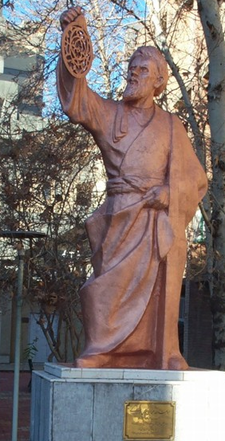Al-Khwarzimi
| Muḥammad ibn Mūsā al-Khwārizmī | |
|---|---|

Khwarizmi statute in Amir Kabir University, Tehran
|
|
| Born | c. 780 Khwarezm |
| Died | c. 850 |
| Academic work | |
| Era | Medieval era (Islamic Golden Age) |
| Notable ideas | Treatises on algebra and Indian numerals |
| Influenced | Abu Kamil |
Muḥammad ibn Mūsā al-Khwārizmī (Arabic: محمد بن موسى الخوارزمی; c. 780 – c. 850), formerly Latinized as Algoritmi, was a Persian scholar in the House of Wisdom in Baghdad who produced works in mathematics, astronomy, and geography during the Abbasid Caliphate.
In the 12th century, Latin translations of his work on the Indian numerals introduced the decimal positional number system to the Western world. Al-Khwārizmī's The Compendious Book on Calculation by Completion and Balancing presented the first systematic solution of linear and quadratic equations in Arabic. Because he is the first to teach algebra as an independent discipline and introduced the methods of "reduction" and "balancing" (the transposition of subtracted terms to the other side of an equation, that is, the cancellation of like terms on opposite sides of the equation), he has been described as the father or founder of algebra.His work on algebra was used until the sixteenth century as the principle mathematical text-book of European universities
He revised Ptolemy's Geography and wrote on astronomy and astrology.
...
Wikipedia
